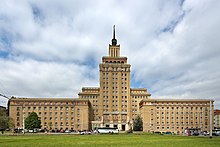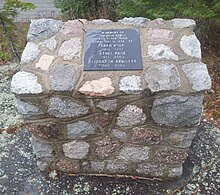Fred Page
He was instrumental in negotiating the revised agreement for the NHL Amateur Draft in 1967, and later served as co-chairman of the resulting joint player development committee.
He assisted in negotiating international hockey participation on behalf of Canada, and was one of the four signatories of the agreement to play the 1972 Summit Series between the Canadian and the Soviet Union national teams.
[2][7] During game three of the 1953 Memorial Cup Western Canada final, Leo Konyk scored an overtime game-winning goal for the St. Boniface Canadiens, then grabbed Page who was refereeing, and began dancing with him at center ice.
[12] At the 1961 general meeting of the CAHA, Page made a motion to provide greater compensation for the visiting team in senior ice hockey playoffs to cover travel expenses.
[25] He also admitted a mistake in the Western junior playoffs structure, and agreed to revisit the issue as proposed by Jimmy Dunn and the MJHL.
Discussions included concerns about financial burdens on owners, junior age limits, and a draft proposal with the NHL to end direct team sponsorship.
[20] He wanted the CAHA to gain more control over its affairs, become more independent from the NHL, a move away from junior-aged players being bound by contracts to professional teams.
[36] He entered into negotiations for a new player development agreement between the CAHA, the NHL, and the Amateur Hockey Association of the United States (AHAUS).
[1] Page and NHL president Clarence Campbell announced a new tentative five-year agreement on August 19, 1966, with several proposed changes to the existing system, effective July 1, 1967.
The dissenting teams dropped out of the SJHL, and formed the independent Canadian Major Junior Hockey League (CMJHL) which was not sanctioned by the CAHA.
The CAHA invited teams and players to rejoin the SJHL or the Alberta Junior Hockey League to be eligible to compete for the Memorial Cup.
[46] On the international side of the game, the new agreement that Page negotiated with the NHL included provisions for players to be reinstated as amateurs after two years of not playing professional, or by a review board for a quicker decision.
[51] The agreement also set up a joint player development committee to grow the talent pool and skill level, and Page served as its co-chairman.
[1][41] The CAHA constitution was amended at the general meeting to give absolute powers to the executive when needed, which aimed to prevent further court cases.
[52] Later in 1967, the IIHF awarded Canada hosting duties for the 1970 World Ice Hockey Championships A pool, and gave permission to use minor league professionals and reinstated amateurs at event.
He felt that professional contracts were more lucrative to Canada's best younger players than the $2,500 scholarship which the CAHA offered to cover tuition and living expenses.
[55] The CAHA invited all cities in Canada with arenas of 10,000 seats or more to bid for hosting games in the 1970 World Ice Hockey Championships.
[51] The Winnipeg Free Press speculated that Vancouver and the Pacific Coliseum had a good chance of hosting, due to Page residing in the area.
[57] The CAHA later approved a proposal for a transatlantic hockey league, including the national teams from Canada, Soviet Union, Czechoslovakia, Sweden, and the United States.
[58] The league never came to be as Sweden and Czechoslovakia expressed concerns about travel time since players worked other jobs, and no commitment was made by the Soviets.
The WCHL had switched allegiance from the CAHA to the CHA in June 1968, in a dispute over the age limits from the new NHL draft agreement Page had negotiated.
He said that changes would be made to the QAHA constitution to "give a greater voice and representation to all categories", and thereby appease the breakaway Quebec Amateur Hockey Federation.
[62] He also approved of the Japan Ice Hockey Federation sponsoring Hiroshi Hori, to play as an imported junior for the Winnipeg Monarchs in the 1968–69 season of the MJHL.
[63] On October 22, 1968, Page confirmed he received the resignation of Pollock as president of the CAHA with "deep regret", and that no changes in positions would be made until the executive meeting in January.
[64] Page was later put in charge of the western 1969 Allan Cup playoffs,[65] and acted as co-chairman of the 1969 CAHA general meeting at the Palliser Hotel in Calgary, along with Joe Kryczka the AAHA president.
[2][5] For the planned 1970 World Ice Hockey Championships in Canada, Page stated that the deadline to enter was extended by a week, to allow the Soviets to decide whether they will attend due to disagreements on the proposed schedule.
[74][75] Page attempted to work out a compromise by suggesting that Canada host an exhibition tournament instead of an official World Championship,[53] and attended an emergency meeting of the IIHF to discuss the Olympic eligibility concerns along with Gordon Juckes and Dawson from the CAHA.
[76][77] The IIHF ultimately decided against allowing professionals at the 1970 World Ice Hockey Championships, with Ahearne casting a tie-breaking vote against it.
[5] In 1951, he joined the Port Arthur Shipbuilding Company (PASC) on a part-time basis to set up its aircraft division, and supply parts under subcontract to Can Car.
[4] He and Ethel frequently travelled together to international hockey events,[95] and returned regularly to Thunder Bay, Ontario, supporting the local Hall of Fame induction dinners.







